The Anglican Church of Canada is a full communion partner with the Evangelical Lutheran Church of Canada. They both believe much the same things, none of which have anything to do with Christianity. They even conceal their disinterest in the orthodox faith with the same befuddling fudge. As the saying goes, “those who smudge together fudge together”.
Both denominations are equally obsessed with all things 2SLGBTQIA+, so much so that a member of the ELCIC clergy is in “a self-defined polyamorous relationship.” In September 2021 she (yes, “she”) was suspended from the roster of ordained ministers of the ELCIC:
“for her willful noncompliance with the standards and practices and the constitution, administrative bylaws and enactments of the ELCIC described in para. 3 of the Manual Re: Discipline of Rostered Ministers, until such time as the ELCIC recognizes and affirms polyamorous relationships for rostered ministers.”
Notice the part in (my) bold.
The clergywoman appealed the suspension, and the appeal was successful because (again, my bold):
Neither the SSHS (Social Statement on Human Sexuality) nor a prohibition against polyamory is found in these provisions, as required by para. 3. For this reason the majority finds it unnecessary to determine whether the SSHS should be interpreted as prohibiting polyamory.
In other words, since the ELCIC does not explicitly forbid polyamory by name, it must be fine. The same argument was used by ACoC dioceses to justify performing same-sex marriages: The canons don’t mention it, let’s do it.
The ELCIC has not yet given blanket approval for polyamory, but it is on the agenda for discussion. As the article below points out, there are “cultural realities surrounding marriage” and where the culture leads, the ELCIC follows. So does the ACoC.
Who said the slope isn’t slippery.
From here:
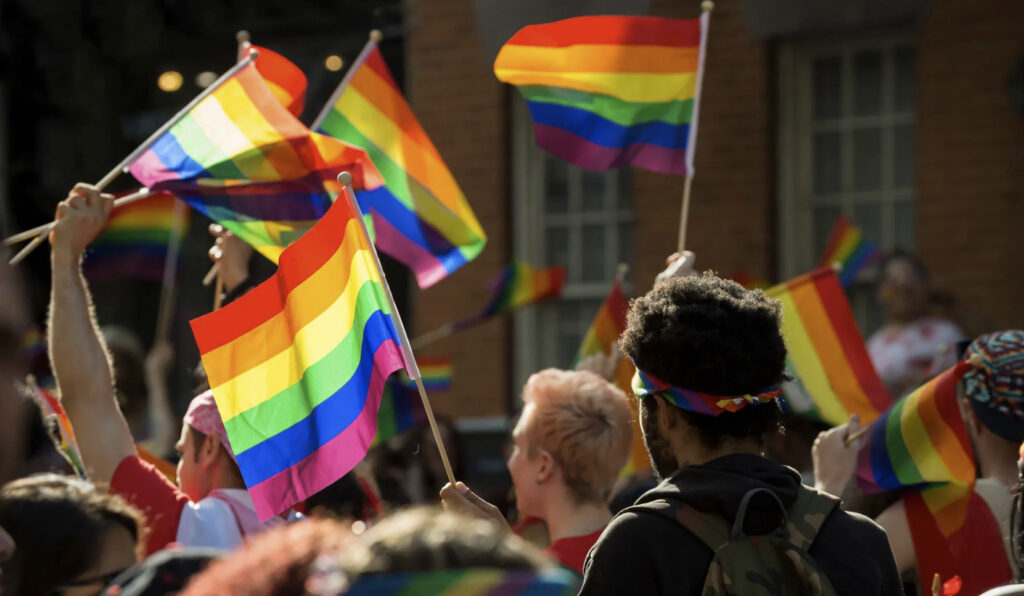 This article’s original headline has been changed at the direction of General Synod senior management. {Note: the original title included the word “polyamory”. So much for editorial independence – David}
This article’s original headline has been changed at the direction of General Synod senior management. {Note: the original title included the word “polyamory”. So much for editorial independence – David}
The Anglican Church of Canada’s full communion partner, the Evangelical Lutheran Church of Canada (ELCIC), will discuss at its convention this summer a set of recommendations on gender and sexuality including one asking that it discern a position on polyamory, the Anglican Journal has learned.
The recommendations come from the ELCIC task force on homophobia, biphobia and transphobia, formed after the Lutherans’ national meeting in 2019 commissioned groups to work on diversity, equity and inclusion for issues of gender and sexuality, racism and ableism. The task force presented its first version in a report at ELCIC’s 2022 National Convention, with an updated version on the table for discussion this summer.
Trina Gallop Blank, ELCIC director of communications, shared the list of recommendations with the Journal. It calls on the ELCIC to promote a healthy understanding of sexuality and consent; review church policies for “language and other systemic problems that might cause harm or inequity to 2SLGBTQIA+” people; increase its visibility as an affirming church by participating in local Pride parades; encourage ELCIC members to specify and acknowledge pronouns wherever they identify themselves or others; make a public apology and, possibly, pay reparations to 2SLGBTQIA+ people who have been harmed by the church; and train its staff on sexual orientation and gender identity, among other things. The list concludes with a statement that the church should create resources to “support listening, safe conversations, and discernment at all levels of the church around healthy, consensual relationships, including ethical non-monogamous relationships.”
The newer version contains many of the same recommendations as the draft submitted in 2022. However, where the current version suggests conversations and discernment around non-monogamous relationships, last year’s included three recommended changes to the church’s treatment of marriage. These state that the church should “review and revise the definition and understanding of ‘marriage’ in the Social Statement on Human Sexuality and the church’s disciplinary policy for rostered ministers to include polyamorous and ethically non-monogamous understandings of marriage.”
Like this:
Like Loading...
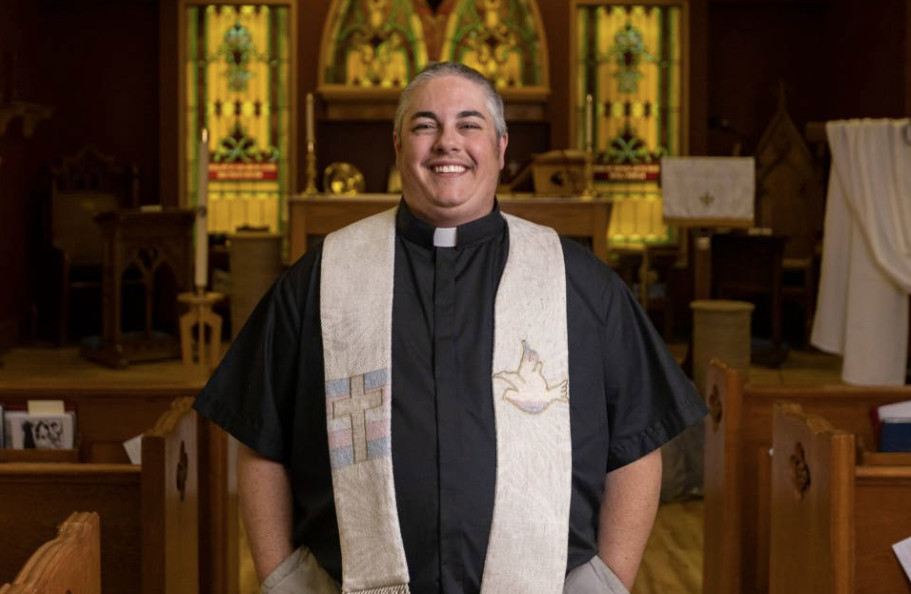 Rev. Theo Robinson, a transgender priest in the Diocese of Rupert’s Land, is one of the people responsible for producing the newly adopted liturgies for gender transition and affirmation.
Rev. Theo Robinson, a transgender priest in the Diocese of Rupert’s Land, is one of the people responsible for producing the newly adopted liturgies for gender transition and affirmation.

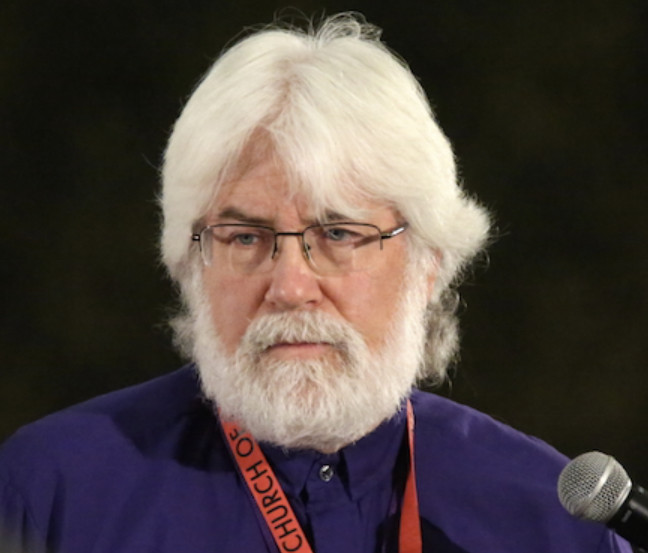 The majority of our denomination is solid. The Diocese of the Arctic is part of the worldwide Anglican Communion. People fail to remember that the revisionists in Canada and the USA are the minority in the Anglican Communion. They just have a loud voice and often use that voice to monopolize, or bully. As an Anglican, I’ve grown up reciting psalm 95 to warn me about not having a hard heart. I’ve read the book of Judges, when the people often turned back to the world, and I’ve read the prophets, who warn us to not follow the gods of this age or past ages.
The majority of our denomination is solid. The Diocese of the Arctic is part of the worldwide Anglican Communion. People fail to remember that the revisionists in Canada and the USA are the minority in the Anglican Communion. They just have a loud voice and often use that voice to monopolize, or bully. As an Anglican, I’ve grown up reciting psalm 95 to warn me about not having a hard heart. I’ve read the book of Judges, when the people often turned back to the world, and I’ve read the prophets, who warn us to not follow the gods of this age or past ages.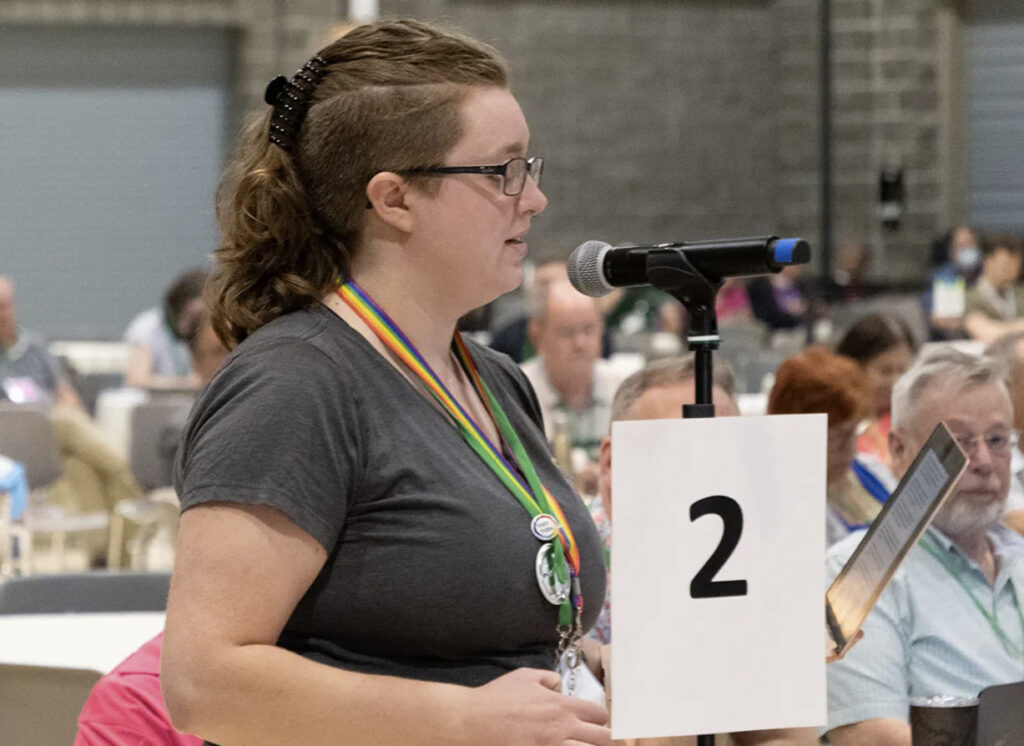 Alex McPhee, lay member from the diocese of Qu’Appelle, spoke in favour. McPhee described how in preparing to attend his first General Synod, he had sent the text of the pastoral liturgies to some transgender friends—all of whom, he said, “not by their own choice, have been hounded out of their birth church communities.”
Alex McPhee, lay member from the diocese of Qu’Appelle, spoke in favour. McPhee described how in preparing to attend his first General Synod, he had sent the text of the pastoral liturgies to some transgender friends—all of whom, he said, “not by their own choice, have been hounded out of their birth church communities.”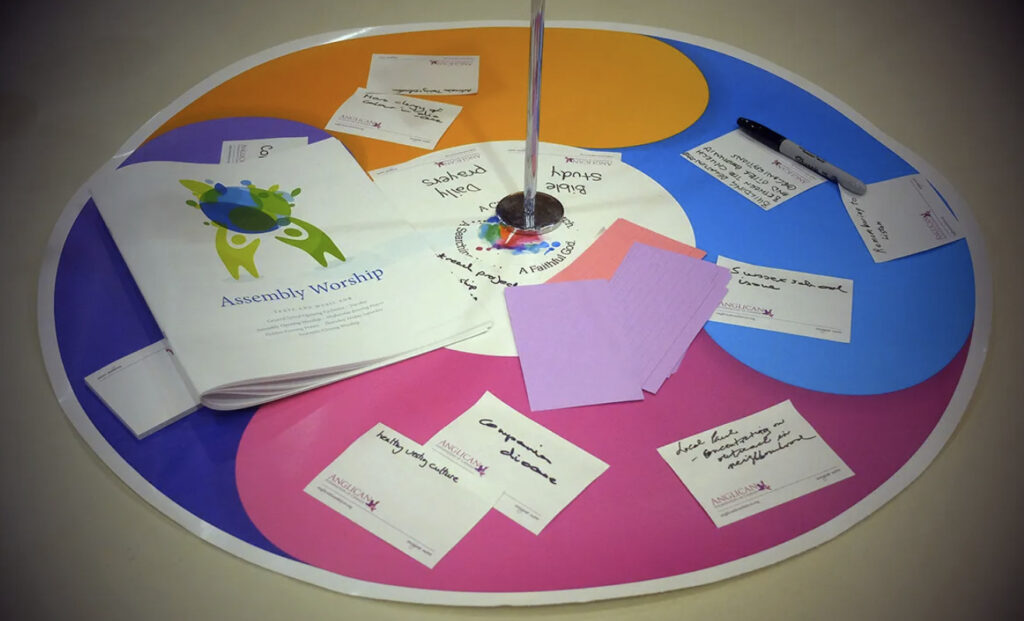 General Synod has overwhelmingly approved five priorities or “transformational aspirations” prepared by the Strategic Planning Working Group (SPWG) to serve as the basis for the Anglican Church of Canada’s new strategic plan.
General Synod has overwhelmingly approved five priorities or “transformational aspirations” prepared by the Strategic Planning Working Group (SPWG) to serve as the basis for the Anglican Church of Canada’s new strategic plan.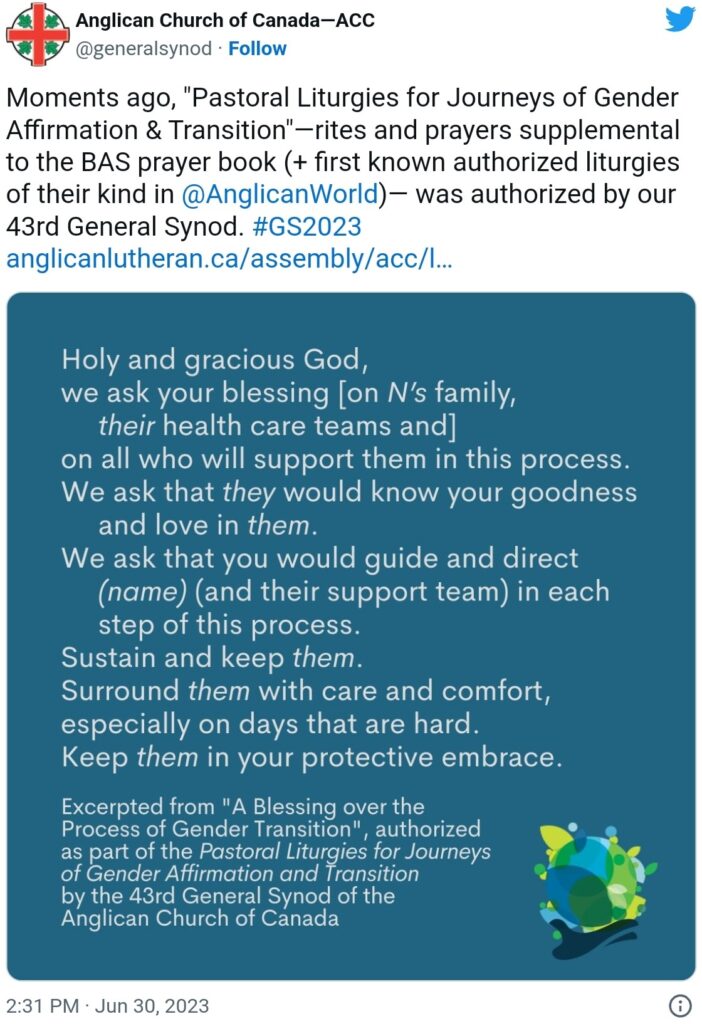
 Leaders of Canadian Anglican, Lutheran, United and Presbyterian churches, including Archbishop Linda Nicholls, primate of the Anglican Church of Canada, met with MPs from the Liberal and Conservative parties April 27 to “advocate for a just and lasting peace in Palestine and Israel,” according to a news release issued on a shared Anglican-Lutheran website the same day.
Leaders of Canadian Anglican, Lutheran, United and Presbyterian churches, including Archbishop Linda Nicholls, primate of the Anglican Church of Canada, met with MPs from the Liberal and Conservative parties April 27 to “advocate for a just and lasting peace in Palestine and Israel,” according to a news release issued on a shared Anglican-Lutheran website the same day.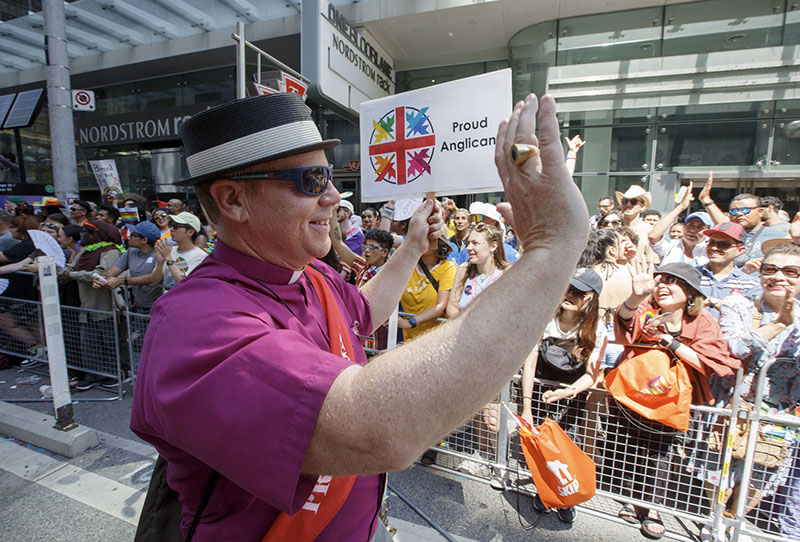
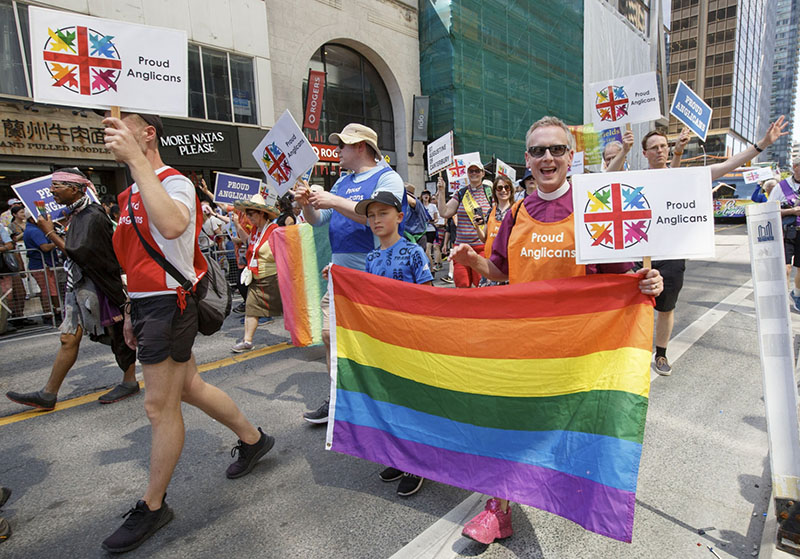
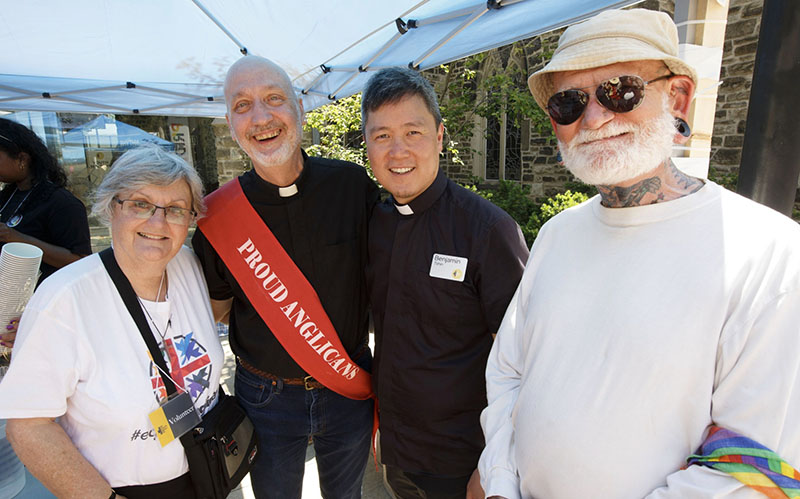
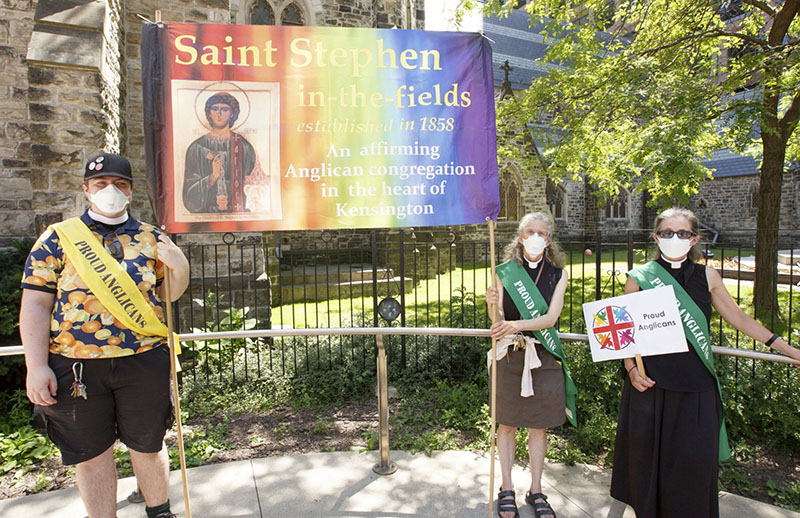
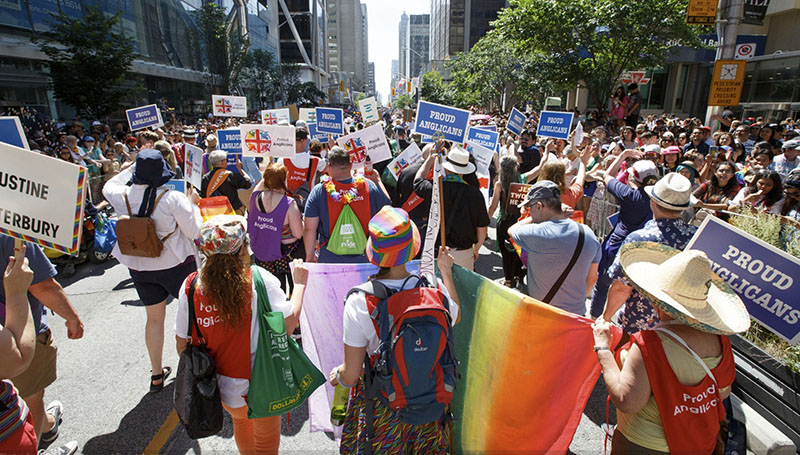
 This article’s original headline has been changed at the direction of General Synod senior management. {Note: the original title included the word “polyamory”. So much for editorial independence – David}
This article’s original headline has been changed at the direction of General Synod senior management. {Note: the original title included the word “polyamory”. So much for editorial independence – David}